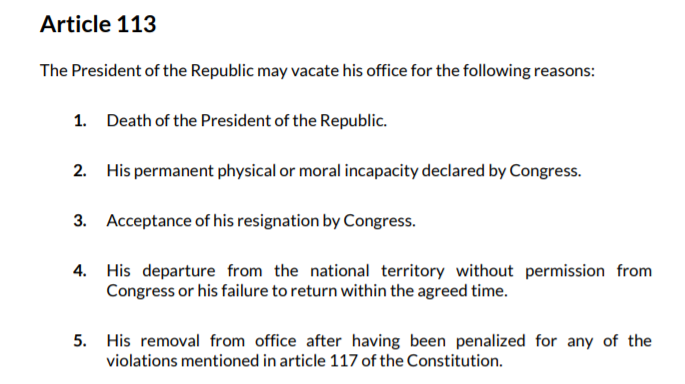Ok, so, what happened in Peru? Let me explain.
The Constitution states that the President can only be "accused" of 3 main things: treason, preventing elections, or disolving/obstructing Congress. But.... https://twitter.com/Alonso_GD/status/1325967623650226177
The Constitution states that the President can only be "accused" of 3 main things: treason, preventing elections, or disolving/obstructing Congress. But.... https://twitter.com/Alonso_GD/status/1325967623650226177
It also states that the Presidency can be declared "absent" if the President dies, resigns, flees, is removed under art. 117 or - and this is key - he suffers from "permanent physical or moral incapacity"
These are all meant to be objective criteria. Is the President there? or is he not there? And done. But, then, what about "moral incapacity"? In old Spanish legalese, this term refers to having a mental disability. So, permanent "mental or physical incapacity" leads to "absence"
This makes sense. If you want to remove the President you need to invoke Article 117 and have a trial - ONLY for the approved criteria. If the President is "absent", you invoke 113.
In 2000, however, when autocrat Alberto Fujimori fled Peru among accusations of mass corruption, he tried to resign through fax from Japan. Congress, outraged, refused to accept the resignation and instead held him "absent" due to "permanent moral incapacity" under art 113
This was big. Congress decided to reinterpret "moral incapacity" to refer to immorality, technically, outside the bounds of Constitutional practice. But it was Fujimori, a once in a century scandal! So... its not like it would be a precedent, or an easy to meet stanard, right?
Move forward to 2016. The Fujimorista controlled Congress tried to declare President PPK absent for moral incapacity cuz he "lied" and he "did not set up a Chinese Wall with his private ventures after assuming the Presidency". Both wrong, for sure, but not comparable to Fujimori
While the attempts fail, politically, PPK was too weakened and had to resign. His successor, Martin Vizcarra, also faces opposition from Congress. He is under investigation for alleged corruption committed before he was President. The investigation is ongoing
Congress argues that this investigation means Vizcarra is "absent due to moral incapacity". The procedure was announced on Oct 21, approved in Nov 2 and voted on Nov 9. A sham of due process. Also, there is no criteria set out for what counts as "immoral" behaviour.
Immorality ends up being whatever 87 votes in Congress says is too immoral. It is impossible to defend against such a charge. In this case, immorality is defined as "having an unfinished investigation open". The disproportion is, of course, evident.
A Constitution designed to protect the Presidency from spurious charges, with only 3 possible charges, is reinterpreted and manipulated into a Constitution where the President can always be removed so long as Congress has the votes to deem him "immoral".
So, no, this is not an impeachment. It is a power grab done by forcing Peru's constitutional law to the breaking point. It is, in essence, a parliamentary coup.

 Read on Twitter
Read on Twitter



